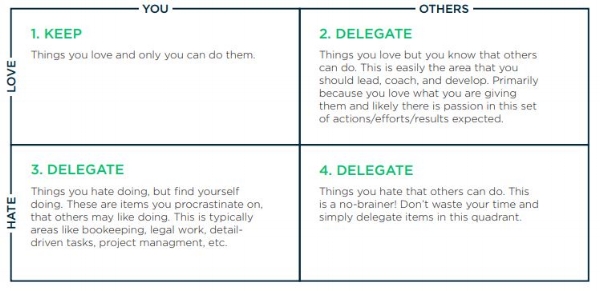I hope you’ve enjoyed this Delegation Series. To wrap up, I’ve invited my Executive Assistant, Brandi, to explain how building trust in our work has enabled me to delegate things to her. Here’s Brandi...
I have had the honor of working alongside Scott for over three years now. At the beginning of our working relationship, Scott delegated to me tasks of a traditional Virtual Assistant, such as calendar management, travel coordination, copy-editing, and social media management. Although I still have involvement in some of these areas, my role within Scott’s company has evolved quite a bit, allowing me to partner with him in new ways that develop and grow his business.
These days I spend the majority of my time overseeing the full administrative scope of Scott’s coaching and consulting practice: contracting, designing and distributing program materials, administering assessments, managing coaching engagements, invoicing, and much more. Additionally, I regularly have the opportunity to partner with Scott to help guide and manage special projects, external contractors, and various growth opportunities.
As Scott and I have developed our working relationship, one very key attribute has determined our success: trust.
Merriam-Webster defines trust as, “assured reliance on the character, ability, strength, or truth of someone or something.”
Scott and I define trust as:
Full access to work directly with his clients, knowing that I will treat them with the utmost respect, kindness, and care, to ensure the success of the program, coaching engagement, or consultation.
Confidence in my decision making, allowing me the freedom to select travel arrangements, schedule meetings, edit content, and make recommendations without questioning or hesitation.
Reliance on each other’s areas of expertise. Recently, while talking through a project we were about to pull the trigger on, Scott said, “I am hesitating, even though I know this is the right direction, but I just can’t visualize it.” Within seconds I was able to virtually share my computer screen, walk him through a demonstration of a similar project, and give him the visuals he needed to ensure confidence in moving forward.
With trust as the foundation, Scott and I have found a rhythm that allows each of us to work within our strengths. As a result, not only are we both happy in our roles, but Scott’s business is thriving, his clients are happy, and he is free to spend his days doing what only he can do (even if it means leaving the office an hour early to play some golf or spend time with his sweet granddaughter, Natalie).
So, how do you develop this kind of trust with your team?
Here are a few things that have helped us:
Prioritize regular communication. Scott and I meet first thing each Monday morning via video conference to catch up and talk about the week’s priorities.
Be reliable. Scott and I have proven to each other that we will do what we say we will do. If we encounter delays or roadblocks, we communicate our concerns quickly.
Create an environment where it is safe to fail. In our very first meeting a few years ago Scott told me that on our team there is no blaming. When we fail, we are not interested in pointing fingers, we focus on making it right and learning so that the mistake is not repeated. I have heard Scott reiterate that to our team throughout the years and I believe this has significantly contributed to an environment of trust.
Trust is not something that develops overnight, but with the right person in the right place on your team, you will be amazed at what you can accomplish together as trust grows. If you are interested in exploring the idea of finding a new team member who can partner with you in similar ways, I encourage you to reach out to BELAY.





